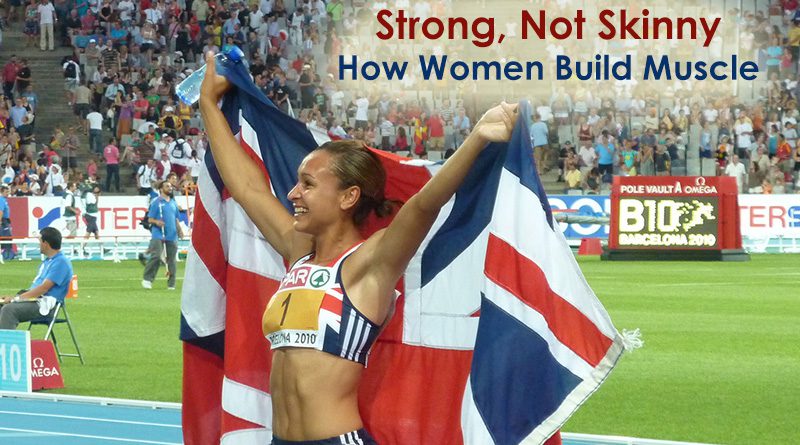Strong Not Skinny: How Women Build Muscle
The ‘fitspo’ trend and its ‘strong not skinny’ mantra has overhauled the way many of us think about our exercise regimes, and will continue to do so in 2016. The popularity of the 2012 Olympic Games and the enviable power and strength of female athletes, such as Jessica Ennis-Hill, had a profound impact on our perceptions of the ‘ideal’ body. Facebook and Instagram stars, such as Christmas Abbot and Amanda Bisk, have inspired us to embark on a new fitness goals with an emphasis on muscle building, strength and tone. In what was traditionally seen as a male domain, female weight training has taken off in a big way, with many gym devotees now on a quest to be strong, not skinny.

“Jessica Ennis” by albarinm
What are the benefits of weight training?
Weight training has a wealth of benefits. It preserves muscle mass, aids fat burning, reduces the risk of osteoporosis…the list goes on. It’s not just about ‘bulking up’, but being toned, lean and fit and should be an integral part of your workout. According to The Journal of Strength and Conditioning Research, women who do an hour of strength training burn around an extra 100 calories the following day.
That’s because weight training gives you a ‘metabolic boost’, effectively raising your RMR (Resting Metabolic Rate). Adipose tissue (fat) uses no energy to just sit on your body so you won’t lose it unless you exert enough energy to begin using the fat as your source of energy. Muscle tissue is also known as “active tissue” because it requires energy to sustain itself. To just sit on your body, each pound of muscle on your body burns around 30-60 calories each day.

“Young woman weight training” by LyndaSanchez
Do men and women need to train differently?
In general, the answer is no. Both sexes need to apply the same common principles – heavy lifting, a good diet and rest days to allow the body to recover. Of course, there are hormonal differences between men and women which mean we respond differently to exercise. Women, for instance, have more of a tendency to store body fat which may make it more difficult for you to shift those last few pounds from your hips or tummy.
Also, women do not have the same levels of testosterone as men. Many women are afraid of weight training because they think it will make them bulk up to mammoth proportions. However, this is simply not the case. Women actually build muscle at about half the rate of men so there’s no reason why you can’t train just as hard.
If you are a woman and want to build muscle and gain definition then never-ending reps with light weights isn’t the answer. While this method will aid endurance, if you want to make an impact you need to really push yourself and lift heavier weights with fewer reps.
Supplementing your training

“Melon, Banana & Orange juice” by Katrin Gilger
There is such an overwhelming choice of training supplements on the market at the moment that it can be difficult to know where to start. From protein powders to energy bars to pre-workout supplements – it can be a minefield. The first thing to do is to figure out if you need to supplement your training. Take a look at your diet and whether it is conducive to your strength training goals. Remember, to build a pound of muscle the body requires an extra 10-14g of protein per day (approximately two eggs). If you aren’t getting this extra protein from your day-to-day diet then you might want to consider incorporating protein powder.
Protein powder can be consumed as a drink or you can add it to smoothies and porridge. There are also plenty of protein snacks out there such as Quest protein bars at Predator Nutrition, for example, which provide 20g of protein per bar and are low in sugar. These can be a good option if you’re trying to avoid unhealthy snacks but also want something which will aid your training goals and your recovery.
Of course, it’s great if you can get all the protein you need from your normal food intake. However, this can be difficult if you need to eat on the go or don’t have time to prepare protein-rich meals every day.
Ultimately, like any exercise, weight training is all about understanding your body and how you respond to exercise. Some women may notice results faster than others but, in general, most women will see a 20-40% increase in muscle mass after a few months of training. If you really want to change your body then weight training, coupled with a balanced, protein-rich diet, will ensure you see results.
